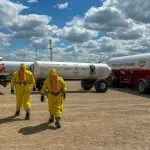
Cumberland College’s Agriculture Sciences Certificate balances students’ school and work life
Strong, well-established, out-of-province agriculture education closer to home.
That’s what Cumberland College is bringing to its Melfort campus with the Agriculture Sciences Certificate program again in July 2021, after a very successful first offering of the program during the 2020-2021 academic year. Even with the many challenges brought on by the COVID pandemic, including having to retool the schedule for the 2020 program, the first offering of the program can me marked a definite success that provides a solid foundation for future offerings of the Agriculture Certificate program.
Cumberland College’s Chair of Post-secondary Education, Jeff Fisher, said the certificate is in partnership with Lakeland College in Vermillion, Alta. The emphasis is on crop production with students learning everything from plant science and field crops to weed and herbicide management, pesticide applications, and even going into areas of business records and reporting as it applies to agriculture.
“We identified that some students were traveling out of province to do schooling for agriculture, and we thought what we would want to do is give them the option to do that a little closer to home,” Fisher said. “We’re going to offer the program on a different schedule than Lakeland does on campus. We’re hoping that will make it more desirable for our students and also make it a little more manageable for students who are also working in the agriculture industry.


